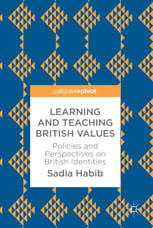Book Launch: Learning and Teaching British Values
by Sadia Habib

Date: Thursday, 30 November 2017
Time: 4.30-6.30pm
Location: Rooms 109 & 110, Ground Floor, Margaret McMillan Building
On Thursday 30 November, Sadia Habib will be speaking about her book, ‘Learning and Teaching British Values’ at a joint event with her esteemed colleague from the Department of Educational Studies, Julia Hope, who will also be launching her book ‘Children’s Literature about Refugees: A catalyst in the classroom’. In this book, Julia explores ways of engaging in class with children’s books about refugees. Using Beverley Naidoo’s novel ‘The Other Side of Truth’ along with a book aimed at younger children, Mary Hoffman’s ‘The Colour of Home’, she offers concrete case studies on how children’s literature about refugees can be used productively in the classroom.
Dr Sadia Habib taught English at Key Stages 3, 4 and 5 in Manchester and London. She has completed both her MA and PhD in Education at Goldsmiths. Below she tells us more about her book:
My lifelong interest in and personal experience of identity issues received theoretical grounding when I completed my MA in Education: Culture, Language and Identity and my PhD in the Department of Educational Studies at Goldsmiths.
Born and bred in multicultural Britain, with Pakistani Muslim parentage, complex and evolving discourses of Britishness impact upon my social experiences. Whilst I frequently (re)negotiate my multiple attachments and my diasporic dilemmas of local, national and transnational belongings, encountering other people’s fascinatingly diverse identities encourages me to ardently seek their stories too. My doctoral research came about because I was fascinated by politicians’ proposals that schools should teach Britishness, and I mused over how this might be done in the classroom.
To counter an almost monochrome and melancholic depiction of a mythical Britishness of the past that has seeped into our national imaginary, my empirical research moved forward by including the voices of ethnic minority and White working-class young people from southeast London as they seek to rethink and redefine contemporary (national) belongings and identities.
I have published part of my PhD as a book. The book addresses the ways in which Art teachers and trainee teachers are working out how they might best incorporate exploration of identities in their lessons. Rather than teaching students about politicised and hegemonic versions of Britishness, in the book, I draw upon the ways teachers can choose to galvanise young people to speak boldly about what it means to be British.
My research draws upon critical ethnography, arts-based educational research, as well as critical race methodology and critical pedagogy. I believe these approaches are necessary for valuing participant voice and empowerment, thereby advancing social justice and social change. My book highlights how there is great potential in critical pedagogy for teachers and students wanting to explore identities, social experiences and belongings.
Drawing upon empirical research conducted with trainee teachers, and school students and their teachers, I detail how Britishness and Fundamental British Value (FBV) teaching are perceived by trainee teachers and experienced by young people and their Art teachers. While we are frequently reminded of government policy and perspectives on FBV, we urgently need empirical evidence about the experiences and views of those most immersed in schooling at the classroom level in their everyday lives: teachers, trainee teachers and students.
A big challenge for schools and teacher education institutions is how to respond to trainee teachers and existing classroom teachers consistently reporting that they are inadequately guided or trained to teach young people about multiculturalism and social inequalities. My book explores the benefits of seeking reflections about identities that are meaningful, open and patient, and conducted through structured classroom activities. I argue for the importance of further research on everyday lived experiences of Britishness, as well as on learning about teaching about localised and globalised British identities.
At a time when Fundamental British Values is a requirement placed upon educational institutions, thinking over how British identities might be explored with ethnically, religiously, and culturally diverse students become increasingly important for trainee and in-service teachers, as well as teacher educators.
When teachers are supported in their endeavours to provide students with opportunities to explore multicultural Britishness, my book shows students critically and collaboratively engage with identity issues, advance their own viewpoints, learn about alternative perspectives, and strengthen bonds with peers and teachers. Students feel empowered by having their critical counter-narratives validated and valued. The empirical research detailed in this book leads to the resounding conclusion that where students hear others’ stories and tell their own, schools can become critical sites of opportunity for reflection, resistance and hopeful futures.